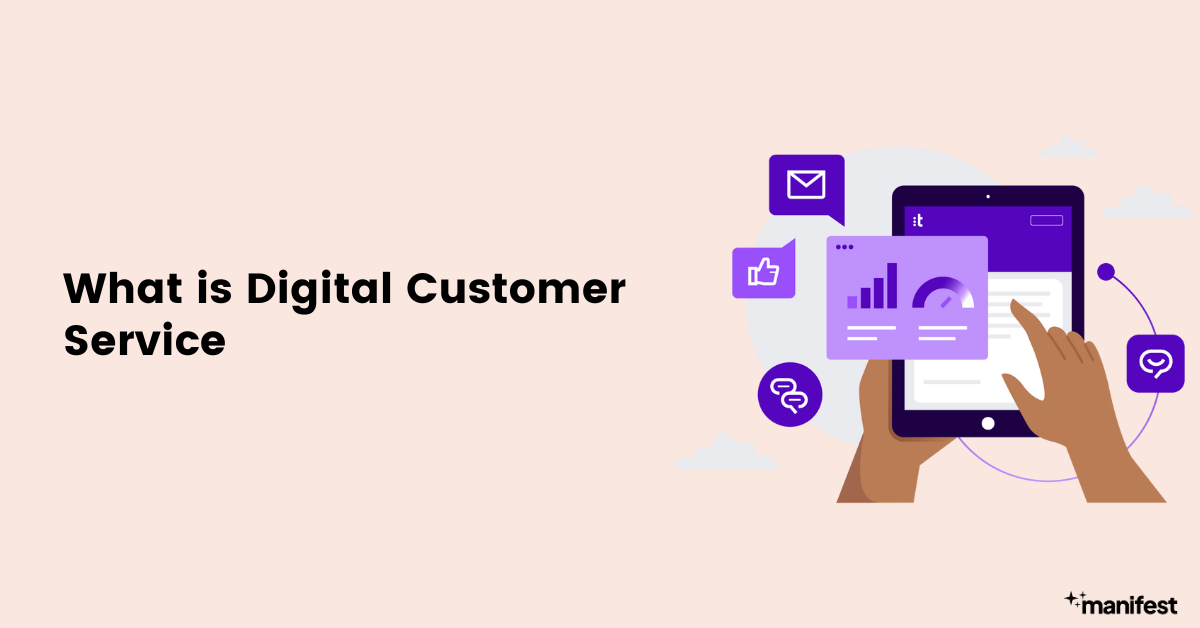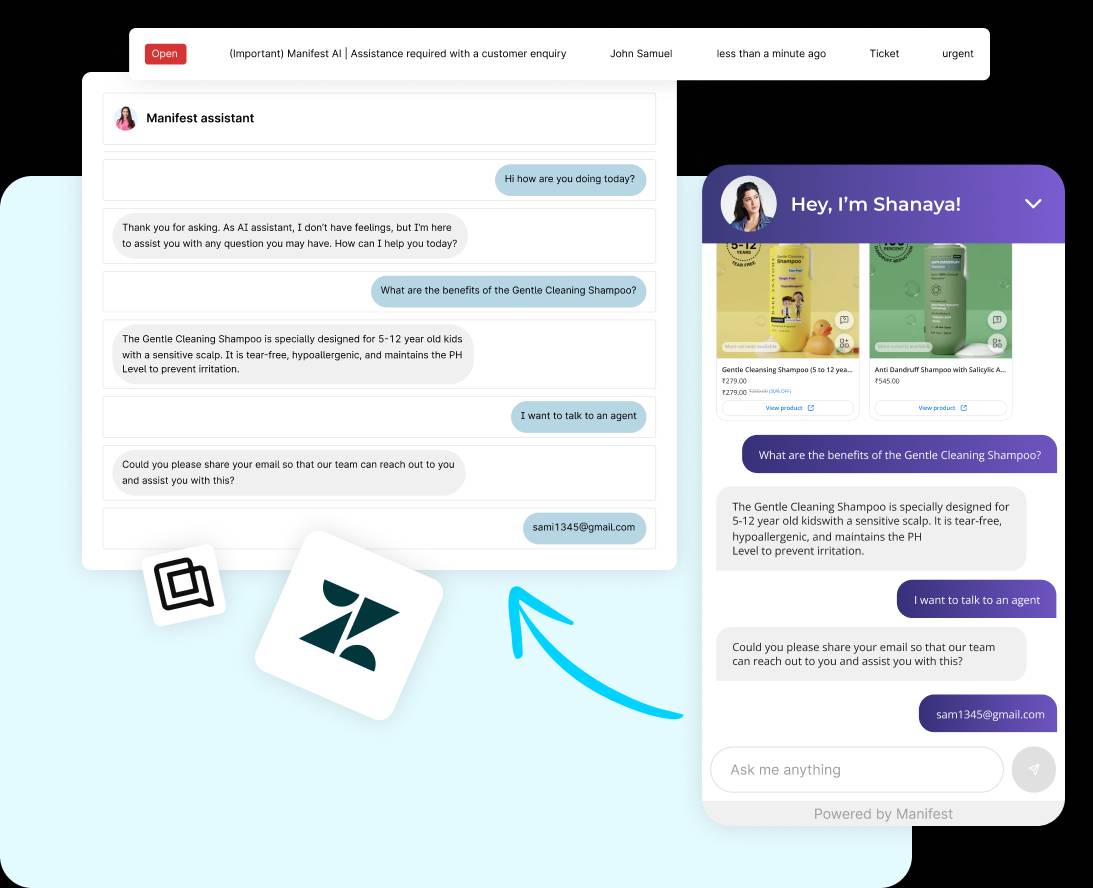What is Digital Customer Service: Platform, Benefits & Strategies

Digital customer service refers to supporting customers through online and digital channels. This includes email, social media support, chatbots, and live chat services. Unlike traditional methods, which rely on face-to-face interactions or phone calls, digital customer service leverages technology to provide timely, efficient, and convenient support.
Evolution of Customer Service
Customer service has evolved significantly over the past few decades. Initially, it involved in-person interactions and phone calls. With the advent of the internet, email support became common, followed by the rise of social media platforms as new avenues for customer engagement. Today, advanced tools like chatbots and comprehensive digital customer service platforms offer round-the-clock assistance and personalized interactions.
Importance of Digital Customer Service
In today's digital age, customers expect quick and efficient service. They prefer interacting with businesses through convenient digital channels that fit their busy lives. Implementing effective digital customer service solutions is crucial for businesses aiming to meet these expectations, retain customers, and maintain a competitive edge.
What is Digital Customer Service?

Digital customer service involves assisting and engaging customers through digital channels. Its core elements include responsiveness, accessibility, personalization, and efficiency. These elements ensure that customers have a seamless and satisfactory experience when seeking support online.
Digital Customer Service Vs Traditional Customer Service
Traditional customer service often involves direct human interaction, whether in person or via phone. While this method has its advantages, such as the personal touch and immediate problem resolution, it can be limited by hours of operation and staff availability. Digital customer service, on the other hand, offers the benefits of 24/7 availability, scalability, and the ability to serve multiple customers simultaneously through automation and digital tools.
Digital Customer Service Platforms
Effective digital customer service platforms are characterized by several key features, including:
- Multi-channel support: Integration with various communication channels like email, social media, live chat, and more.
- Automation tools: Chatbots and AI shopping assistant responses to handle routine inquiries.
- Analytics and reporting: Tools to track performance, customer interactions, and satisfaction levels.
- Integration capabilities: Seamless integration with CRM systems and other business tools.
Popular Digital Customer Service Platforms

Several platforms are widely used for digital customer service, each offering unique features:
- Manifest AI: This AI shopping assistant is popular for understanding customer intents, recommending the perfect product, and assisting in the overall purchase journey using AI-powered GPT-4. Increase your conversion rate and average order value with AI-driven nudges, quizzes, and search & recommendations.
- Zendesk: Known for its comprehensive suite of tools for ticketing, live chat, and customer insights.
- Intercom: Offers powerful messaging and chatbot capabilities tailored for businesses of all sizes.
- Freshdesk: Provides multi-channel support, automation features, and an intuitive interface.
- Salesforce Service Cloud: A robust platform that integrates with other Salesforce products for a unified customer service experience.
Benefits of Digital Customer Service

Digital customer service enhances customer satisfaction and operational efficiency through various advantages:
Enhanced Customer Experience
Digital customer service improves the overall customer experience by providing quick, convenient, and efficient support. Customers appreciate the ability to reach out at any time and receive timely responses, which builds trust and loyalty.
Cost Efficiency
Digital channels often reduce the cost of customer service by automating routine tasks and enabling a smaller team to handle more inquiries. This efficiency translates to cost savings and allows businesses to allocate resources more effectively.
Improved Data Collection
Digital interactions generate valuable data that can be analyzed to understand customer behavior, preferences, and pain points. This data-driven approach helps businesses refine their strategies and improve their products and services.
Increased Accessibility
Digital customer service platforms ensure that support is accessible to a wider audience, including those who may have difficulty with traditional communication methods. This inclusivity is crucial for reaching a diverse customer base.
Strategies for Implementing Digital Customer Service
Implementing digital customer service involves strategic planning to meet customer needs effectively and efficiently.
Identifying Customer Needs
Understanding your customers' needs is the first step in implementing effective digital customer service. Conduct surveys, analyze customer feedback, and monitor social media interactions to gain insights into what your customers expect from your support services.
Choosing the Right Platform
Selecting the right platform is critical for success. Consider factors such as the size of your business, the complexity of customer inquiries, and your budget. The platform should align with your business goals and integrate seamlessly with your existing systems.
Training Your Team
Your customer service team should be well-versed in using the chosen digital platforms. Provide comprehensive training to ensure they can efficiently handle digital interactions and utilize automation tools effectively.
Integrating with Existing Systems
Integration with existing systems, such as your CRM and other business tools, is essential for a smooth operation. This integration helps in maintaining a unified view of customer interactions and ensures that all relevant information is readily available.
Continuous Improvement
Digital customer service is an ongoing process that requires regular assessment and refinement. Collect feedback, monitor performance metrics, and stay updated with the latest trends and technologies to continuously improve your service offerings.
Challenges and Solutions
Common Challenges
Implementing digital customer service can come with challenges such as:
- Technology integration issues: Ensuring all systems work together seamlessly.
- Data privacy concerns: Protecting customer information in digital interactions.
- Maintaining a personal touch: Avoiding the impersonal feel of automated responses.
Effective Solutions
To overcome these challenges:
- Invest in robust integration tools: Choose platforms that offer easy integration options.
- Implement strong security measures: Protect customer data with encryption and secure protocols and consent management platforms to handle customer data permissions effectively.
- Blend automation with human touch: Use automation for routine tasks and ensure human agents handle more complex inquiries.
Future Trends in Digital Customer Service
Emerging Technologies
Emerging technologies such as AI, machine learning, and advanced analytics are set to change digital customer service. These technologies enable more accurate predictions, personalized interactions, and efficient problem resolution.
Predicted Changes in Customer Expectations
As technology evolves, so do customer expectations. Customers will increasingly expect more personalized and immediate responses, seamless multi-channel experiences, and proactive support that anticipates their needs.
Case Studies of Successful Digital Customer Service Implementations
Understand better with these case studies:
Case Study 1: Company A
Company A successfully implemented a digital customer service platform, resulting in a 50% reduction in response time and a significant increase in customer satisfaction. They utilized AI-driven chatbots to handle common inquiries and integrated their platform with their CRM for a seamless customer experience.
Case Study 2: Company B
Company B transformed their customer service approach by adopting a multi-channel support system. This enabled them to provide consistent support across email, social media, and live chat, leading to higher customer engagement and loyalty.
Lessons Learned
Both companies highlighted the importance of choosing the right technology, investing in employee training, and continuously monitoring and improving their service strategies.
Digital Customer Service KPIs
To measure the success of digital customer service, consider tracking KPIs such as:
- Response time: The average time taken to respond to customer inquiries.
- Customer satisfaction (CSAT): Feedback scores provided by customers.
- First contact resolution (FCR): The percentage of inquiries resolved in the first interaction.
- Net promoter score (NPS): A measure of customer loyalty and willingness to recommend your service.
Customer Feedback Mechanisms
Implement mechanisms to regularly collect customer feedback, such as surveys, follow-up emails, and social media monitoring. This feedback is invaluable for identifying areas of improvement and enhancing your service quality.
Final Thoughts
By understanding the core elements of digital customer service, choosing the right platforms, and implementing effective strategies, businesses can provide exceptional support that drives customer satisfaction and loyalty. Continuous improvement and staying abreast of emerging trends will ensure long-term success in this dynamic field.
FAQs
How does digital signage improve business customer service?
Digital signage enhances customer service by providing real-time information, reducing perceived wait times, and allowing businesses to promote services and products effectively. It engages customers visually and can guide them through their in-store experience.
How can businesses choose the right digital customer service platform?
Businesses should consider their size, customer needs, complexity of inquiries, and budget when choosing a platform. It should integrate well with existing systems and align with business goals.
How to improve customer service with digital tools?
Improving customer service with digital tools involves using chatbots for quick responses, implementing a digital ticketing system for tracking issues, using social media for direct interaction, and employing analytics to understand customer needs better.
What digital customer service skills are essential for representatives?
Essential digital customer service skills for representatives include strong written communication, empathy, problem-solving abilities, proficiency with digital tools, and the ability to manage multiple channels simultaneously.
What are digital customer service channels?
Digital customer service channels include email, live chat, social media platforms, mobile apps, and online forums. These channels allow customers to interact with businesses conveniently and efficiently.

.png)
